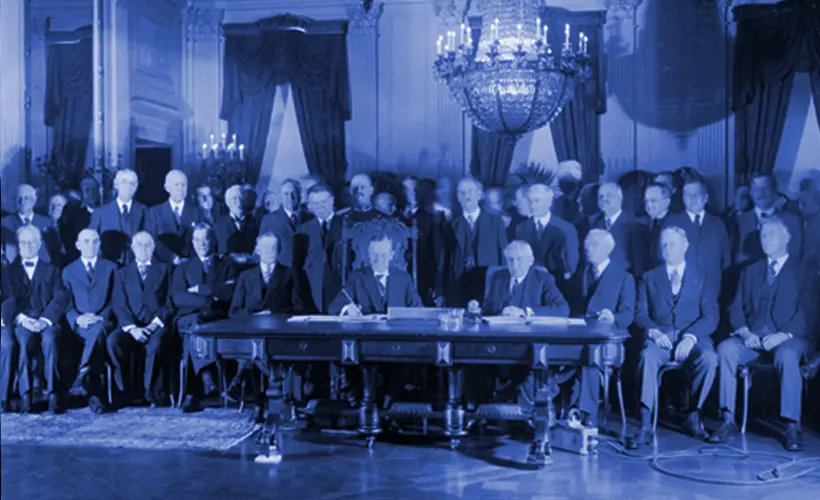A Historical Spotlight from Issues & Controversies in History:
KELLOGG-BRIAND PACT: Should Nations Adopt This Treaty?
Should nations adopt the Kellogg-Briand Pact? Be sure to check out Issues & Controversies in History’s complete and unbiased coverage of this issue. Learn more about the issue and check out a sample of the pro/con arguments on both sides below.
Try Issues & Controversies in History today!
THE ISSUE
In 1928, the United States, France, and several other nations negotiated the Kellogg-Briand Pact, a brief treaty to prevent war by committing countries across the globe to solve their disputes through peaceful rather than military means. Should the nations of the world adopt the Kellogg-Briand Pact?
Arguments That Nations Should Adopt the Kellogg-Briand Pact:
Arguments That Nations Should Not Adopt the Kellogg-Briand Pact:
The Kellogg-Briand Pact would commit the nations of the world to settle their disputes through means other than aggressive war, while still leaving room for countries to militarily defend themselves from attack or invasion. The treaty would change the state of global relations, existing since the 1600s, that had led to World War I in 1914. In addition to outlawing aggressive war, the Kellogg-Briand Pact would help strengthen international arbitration and justice organizations as well as turn countries that did choose to wage war into pariahs. By building on recent advances in global diplomacy, such as the League of Nations, the Locarno Treaties, and several disarmament agreements in the 1920s, the accord would bring the United States back onto the world scene and encourage global cooperation. The Kellogg-Briand Pact’s careful wording would also enable empires such as Great Britain to protect their colonies from uprisings or attacks.
The Kellogg-Briand Pact is an impractical agreement cobbled together by two consummate politicians looking to further their own careers. The absence in this agreement of any clauses criticizing colonial armies and wars means that it will do little to improve global relations or help poor or exploited peoples. A treaty that aims to outlaw the entire system of war through a few hazy paragraphs but doesn’t offer a comprehensive alternative is destined to fail, especially when countries such as the United States have refused to accept systems of conflict resolution like the World Court. The Kellogg-Briand Pact may be well intended, but it is scarcely more than a piece of paper, with simplistic, ambiguous language and no enforcement mechanism, a far cry from the League of Nations, a comprehensive, deliberative body established in 1920 after World War I.
Issues & Controversies in History links this pro/con article to rich related resources that enhance the debate. Students and researchers can delve into primary sources that provide context, a topic-specific timeline, a bibliography, and a thought-provoking “What if…” section that explores what might have happened had the Pact been enforced or worded differently. Plus, discussion questions are provided to inspire critical thinking and analysis.
What Is Issues & Controversies in History?
Issues & Controversies in History places students at the center of the great debates and conflicts in U.S. and world history, exploring the issues as the key players saw them or, in some cases, as historians have interpreted them. This comprehensive reference database delivers dynamic, concise, and balanced coverage of a broad range of topics, from slavery, empire, and revolution to race, gender, economy, and disease, all over the globe. By building a deeper understanding of how historical events and conflicts have influenced U.S. and world history over the past 5,000 years, Issues & Controversies in History is a powerful tool for helping researchers analyze primary sources, answer document-based questions, and prepare for history debates and research projects.
Click here to take a free trial of Issues & Controversies in History.
See also:



